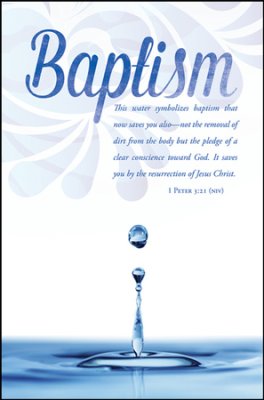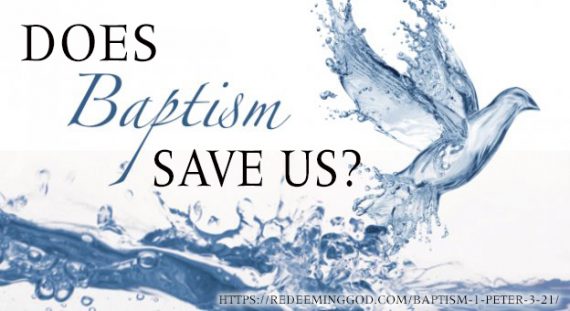When people read 1 Peter 3:21, they wonder if baptism is necessary for salvation. And this is indeed what 1 Peter 3:21 seems to say:
There is also an antitype which now saves us—baptism (not the removal of the filth of the flesh, but the answer of a good conscience toward God), through the resurrection of Jesus Christ (1 Peter 3:21).
So does baptism save us? Yes! According to Peter, it does.
But hold on … Isn’t baptism a work? Isn’t baptism something we do? Yes, it is.
So if baptism saves us, how can it be true that eternal life is received by faith alone in Jesus Christ alone, apart from works?
The solution is relatively simple, once you understand it.
 The solution to understanding 1 Peter 3:21 is to properly define the words “baptism” and “saves.” I define both of these terms in my online course, “The Gospel Dictionary.”
The solution to understanding 1 Peter 3:21 is to properly define the words “baptism” and “saves.” I define both of these terms in my online course, “The Gospel Dictionary.”
This post will briefly summarize how to understand the words “baptism” and “save.” More detailed explanations are found inside the course.
The meaning of the word “save”
In Scripture, the word “save” (saved, salvation, Savior, etc) almost never means “gain eternal life so you can go to heaven when you die.” This is what most Christians think the word means, and this is how most Christians use this word, but the Bible does not support such a definition.
The word “saved” simply means “deliverance” and context determines what kind of deliverance is in view. You can be delivered from enemies, sickness, drowning, premature death, and a variety of other disasters.
Whenever you see the word “saved” in the Bible, stop and think about it. Substitute in the word “delivered” or “deliverance” and then look in the context to figure out what kind of deliverance is in view. Very rarely (if ever) will it refer to gaining eternal life and going to heaven when you die.
This truth right here is going to help you understand 1 Peter 3:21 in a whole new way. While Peter does teach that baptism saves us, a careful study of the context reveals that Peter is not talking about gaining eternal life and going to heaven when we die. He has something else in view.
But to see what Peter has in view, we first need to understand the meaning of the word “baptism.”
The meaning of the word “baptism” in 1 Peter 3:21
The word baptism has caused inordinate amounts of disagreement over the years.
 There was even a time when certain Christians were drowning other Christians over the question of baptism. During the Reformation, one group of Christians got so upset that others were doing baptism wrong, that they decided to baptize those other people to death by drowning them.
There was even a time when certain Christians were drowning other Christians over the question of baptism. During the Reformation, one group of Christians got so upset that others were doing baptism wrong, that they decided to baptize those other people to death by drowning them.
We don’t go this far today. Or do we?
While we may not drown people because of their views on baptism, it is not uncommon for one group of Christians to condemn another group of Christians to everlasting hell because the other group has a different view on baptism.
So we don’t drown them … but we do condemn them to everlasting punishment in hell.
Yeah … maybe things haven’t changed as much as we think.
So we argue and condemn people over the issue of infant baptism vs. adult baptism, baptism by sprinkling vs. baptism by immersion, and whether a person should be baptized in the name of Jesus vs. in the name of the Father, the Son, and the Holy Spirit.
And then we have this form of baptism which is almost child abuse …
Most of these contentious issues can be cleared up simply by properly understanding and defining the word baptism. Baptism is a Greek word which means “immersion” or “submersion.”
Many Bible teachers stop right there and say that the debate between sprinkling vs. immersion is solved. They argue that if the word baptisma means immersion, then clearly, all baptisms must be by immersion.
But it is not quite as simple as that. Although baptisma means immersion, this does not mean that every baptism requires immersion into water.
When all the data is considered, the Bible describes several different kinds of baptisms, and only two of them involve water.
Along with John’s baptism and new believer’s baptism (Acts 2:41; 8:36; 10:47-48; 18:8), there is baptism into Moses (1 Cor 10:2), baptism of the cup and crucifixion (Matt 20:22; Mark 10:38; Luke 12:50), baptism by the Holy Spirit (Acts 1:4-5; 11:16; Rom 6:3-4; 1 Cor 12:13; Gal 3:26-28; Eph 4:5), and baptism with the fire of judgment (Matt 3:11; 13:25; Luke 3:16).
If you were counting, there are seven different kinds of baptism. I have a handout in the Gospel Dictionary Lesson on Baptism which nicely summarizes these seven kinds of baptism.
So it is a vast oversimplification to say that all baptism must be by immersion in water.
In light of all this, while baptism means immersion, it does not necessarily imply water. One can get baptized, or immersed, into almost anything.
To be baptized means to be fully immersed into something so that what is being baptized is completely overtaken and overwhelmed by whatever it is being baptized into.
It means to be fully identified with something, to become one with it.

So what does 1 Peter 3:21 mean?
There are some who teach that both faith and baptism are necessary for justification. Those who teach this often use 1 Peter 3:21 as a proof text for their view.
But if we know that the word “saved” does not refer to “receiving eternal life” in the Bible, we understand that Peter is not writing about the necessity of getting baptized in order to receive eternal life, but is instead referring to some form of deliverance.
Several contextual keys clue us in to what Peter has in mind.
First, it should be obvious that Peter is not referring to believer’s baptism at all, for he indicates that this baptism he is writing about is “through the resurrection of Jesus Christ.” Numerous other Scriptures reveal that water baptism does not actually place us in Christ, but this is done only through Spirit baptism (cf. Rom 6:3-4; 1 Cor 12:13; Gal 3:26-28; Eph 4:5).
Second, while some think that Peter is referring to believer’s baptism because of the mention of water in 3:20, Peter clarifies in 3:21 that he is not talking about the outward washing of the flesh with water but the inner purification of a good conscience toward God, which is accomplished only through the Spirit.
Finally, it should be noted that although 1 Peter 3:21 talks about how Noah and his family “were saved through water,” we should not take this to mean that the water was the instrument or means by which they were delivered from the flood. Far from it!
They were not delivered by the water; they were delivered from the water by the ark. Noah and his family passed through the waters and were delivered from the waters just as some pass through the fire, and are delivered from it.
So you take all this together, and Peter’s point is that just the ark delivered Noah and his family through the waters of the flood which threatened to take their life, so also, we too are delivered from the flood of sin that surrounds us, not by water, but by the Spirit of God (1 Peter 3:18). How? By fully immersing ourselves and identifying with the death and resurrection of Jesus Christ (1 Peter 3:18, 21).
Peter is teaching a sanctification truth. If you want to avoid have your life ruined by sin, Peter says, then learn what it means to have died to sin in Jesus Christ, and to have been raised to new life through His resurrection.
Jesus is the ark that saves us from the flood of sin that surrounds us. If you want to be delivered from the devastating and destructive consequences of sin (see Sin), then you need to follow the ways, teachings, examples, and instructions of Jesus, and especially what He showed us through His death, burial, and resurrection.
So Peter is not saying that you have to get dunked under water in order to go to heaven when you die. That is not his point at all!
In 1 Peter 3:21, Peter is not writing about how to gain eternal life. Instead, Peter is writing about how to live the Christian life.
He writes that the best way to live free from sin like Jesus Christ is to identify with Jesus and follow Him in every way we can.
 Want to learn more about the gospel? Take my new course, "The Gospel According to Scripture."
Want to learn more about the gospel? Take my new course, "The Gospel According to Scripture."
The entire course is free for those who join my online Discipleship group here on RedeemingGod.com. I can't wait to see you inside the course!
Here is a short video that summarizes the ideas in this post:




There has always been confusion about baptism because people choose to continue to obey the laws of Moses. Water baptism is of the old Covenant. Matthew 3 and Mark 1 tells us that John baptized with water for repentance of sin, but in the new and better Covenant that Jesus gave his blood and life for, Jesus now baptizes with His Spirit. When we are saved and born again our old man is dead and buried and we are raised into our new life in Jesus. Jesus lives in us by submerging us with His indwelling Spirit. We are saved by faith in this truth thats not physically visible because we worship God based on the indwelling “Spirit and the Truth” of the word that is Jesus. Our salvation is not based on anything but what Jesus has done and continues to do in us.
Baptism does not save us. The work of Christ on the cross was sufficient – we can add nothing to His vicarious death to “aid” in our salvation.
Biblical baptism is a public declaration of faith in Jesus Christ. Biblical baptism – the volitional, voluntary, submission to publicly identifying with Christ death, burial, and resurrection. Biblical baptism is always “immersion”baptism. Baptism is a step of obedience in the life of a believer. It is not as important as “how” you are baptized (immersion vs. sprinkling) as it is “when” you are baptized. Infant baptism is a pagan ritual and was NOT practiced by the early church. Baptism is an act of obedience in the life of the born-again.
Love your clarity of “being saved from what” according to the Bible and what God really desires us to be delivered from.
Sorry William Wiley, you don’t have facts on your side. How dare you be so sectarian and arrogant. People like you give Christianity a bad name. You are divisive.
James Borlaug…Ugh, you’re merely suggesting the other individual is WRONG, yet you offer up no biblical basis to support that statement(???). A/one can simply say, “You’re wrong”, but that does not get the discussion any further along. And by the way…how is his statement “divisive”? You’ve got some explainin’ to do there young man 🙂
Jeremy your explanation of 1 Peter 3 21 is very clear and makes a lot of sense. I like the use of the metaphor of the ark delivering Noah from the flood of waters to understand how Christ delivers us from the flood of sin in this life if we follow Christ by building a strong relationship with Him. Thank you for debunking this verse
Great post Jeremy!
Just a suggestion you can look up on YouTube David bercot what did the early Christians believe about salvation what did the early Christians believe about baptism. By early Christians he’s referring to the many writings that we have by early Christians such as Barnabas Ignatius hermis Justin Mata Theophilus irenaeus Clement of Alexandria to tertullian and others and others.
Why do people make a simple thing so complex and then feel as though they must defend their opinions ? It’s simple really and Ten different opinions mean little. Christ was Baptized, in water. We are commanded to follow in his foot steps. Done, simple no drama no discussion needed.
Glyn…The fact that Christ was baptized has ZERO to do with the matter. You clearly don’t u/stand WHY He was baptized, else you would not have brought that up (SMH). Christ did a WHOLE lot that we don’t do, nor are we COMMANDED to do, so your little, “We are commanded to follow in His footsteps” statement is worth little to nothing.
Amen!
So right. Baptism DOES save us. But which baptism? Only the baptism of the Holy Spirit. If getting yourself dunked in water gives you a clear conscience before God then you have bigger problems than you thought.
Glyn, Jesus was water baptised to fulfill all righteousness under Jewish law as the high priest.
1 Peter spends 3 chapters talking about remaining obedient during persecution and behaving in a Christlike manner toward others as part of the process of sanctification, and then utters one verse about wa ter, and suddenly everything is about water dunking baptism? No way! We are cleansed by His Word when we are taught (John 15). 1 Peter 3:16 basically tells us this.
1 Peter 3:21 and 3:16 explain each other. The idea that water dunking is for a clear conscience or that it is an outward representation of an inward truth are dangerous man-made doctrines leading to millions of false converts.
Acts 2:37-38
Acts 8:36-38
This shows what is commanded of us, and the act of what we must do to obey the Gospel.
Christ be with you.
That was far too long. I doubt that except for but the bold of heart few people would have read every detail. However, it is true that water baptism can never force the hand of God to save the person so being baptized. Even John spoke of the limits of his baptism, and regarded the Holy Spirit baptism as being far superior.
I had thought that Noah and his family were saved from the sin of those who were destroyed by being in the Ark which represents Jesus. The water washed away the sinful people just as the water washes away our sins–putting to death the sinful self so that we might live in Christ.
David, Peter said about baptism; “(not the putting away of the filth of the flesh, but the answer of a good conscience toward God) 1 Peter 3:21, for (as you mention) the “putting to death the sinful self” was done on the tree (cross) were Christ, “Who his own self bare our sins in his own body on the tree, that we, being dead to sins, should live unto righteousness:” 1 Peter 2:24. It was on the tree that he bled and died for us, and this (believing this) is what save’s! Baptism is “but the answer of a good conscience toward God.”
This is why Philip answered the Ethiopian eunuch, saying; “If thou believest with all thine heart, thou mayest. And he (the eunuch) answered and said, I believe that Jesus Christ is the Son of God.” Acts 8:37. Only then did Philip allow him to answer with “a good conscience toward God.” Thanks
Lord I pray for all of us on this issue my self included who claim YOU to be their Lord! Rather it be in the view of believing and confessing, GRACE through faithn and not of works, or the mentality of “Good enough to go” through our baptism thank you for being our Lord and Savior!
Baptism is not something that you do it is something that is done to you that you allow to happen to you therefore it is not works besides when the Bible speak of works it means the works of the law.
correct
If the word “saved” doesn’t mean gain eternal life, then John 3:16-17 make no sense, God didn’t send his Son into the world to suffer on a cross for nothing. Was the jailer in Acts 16:30 simply asking to be cured from some illness?. If so then his whole family must have been sick.
Baptism doesn’t bring salvation.
Cornelius and the Gentiles with him in Acts 10 clearly received the gift of the Holy Ghost before being baptized. Ephesians 1:13 says you receive the Holy Ghost when you believe the gospel.
It’s the death and shed blood of Jesus Christ that brings salvation
* John 6:54
* 1John 1:7
* Revelation 1:5
* Ephesians 2:13
* 1Peter 1:18-19
* Hebrews 10:10
* Colossians 1:14
* Ephesians 1:7
* Romans 5:9
Excellent attempt to make the Scripture fit your religious heritage… we all tend to do that. There is a difference between explaining and explaining away. I submit: 1) Christ suffered to save us FROM SIN, 1 Pet. 3:18. V. 21=same salvation. 2) God says, I am going to DESTROY the evil world (human and animal). He used WATER to separate between the terminated ones and the delivered ones. 3) the SAME WATER that drowned the sinful, bore the ones being spared up and away. 4) the Ark did not lift the people being delivered away from the earth… the water did. 5) By the same token (like figure) the WATER OF BAPTISM SEPARATES the ones being DELIVERED FROM SIN from the rest of the world. 6) The SAVING POWER is not in the water, but in the victory that JESUS won over sin and death… His Triumphant resurrection. And 7) it’s not in the physical act of itself, but in getting your heart right with God. See Acts 2:38–40.
–E.B.
1 Peter 3:21 as given in scriptures relating to the Baptism as it’s stated Roman 6:3,4 that’s make it plain..A GOD conscience with Faith believing that JESUS Has paid the price of SALVATION (freeing us from sin bringing us back in fellowship with GOD, sustaining us from HIS Wrath to Come John 3:16) as HE went in the Grave and was Resurrected. We the born again Christian going into Baptism as Believing the death of the Old Man is submerge and just as JESUS was resurrected the New man raised up; death burial and resurrection…I call it the watery grave..JESUS PAID IT ALL, ALL TO HIM WE OWE…by faith Noah built and enter the ark, 8 souls were saved and the animals that went in by 2’s the water came and everything that was not in the Ark Died..GOD has sent HIS SON, JESUS
Great discussion. Clearly its not baptism that provides eternal life cause Peter says it is Jesus. So why the conflict between the two parts of the verse. So “baptism saves us” must have something else going on.
Perhaps it what was explained in the article above and perhaps something else. So I like the idea expressed above that in the Great Commission, Jesus says to baptise. Think about it all you want but that should be enough for us.